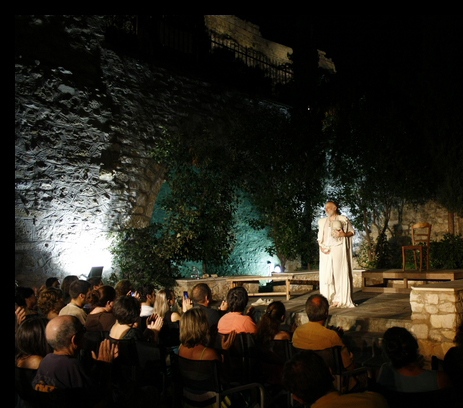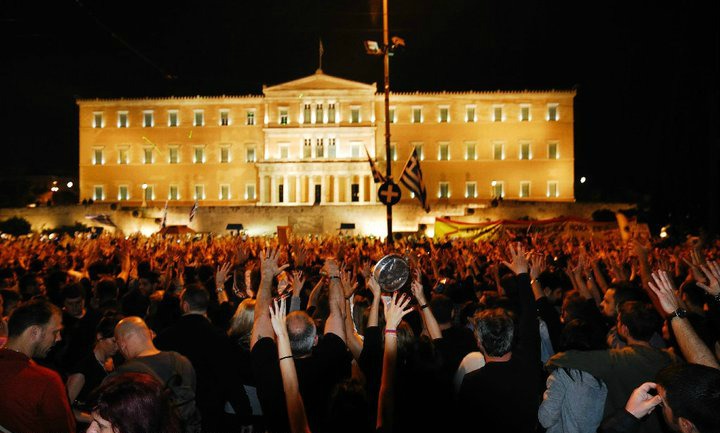
"The Greek crisis is, I believe, above all a crisis of character," says 25-year-old Stephania Xydia. "Recently we woke up and we cannot recognize ourselves in the mirror anymore. This country needs above all a new vision, an identity for the 21st century."
For many young Greeks who face a record 50 percent unemployment rate, immigration seems to be the only practical option. Unlike previous generations, the children of the upper socio-economic classes are the ones who choose to immigrate now – going abroad is expensive. And after British Prime Minister David Cameron announced a potential halt to Greek immigration, questions were raised about the narrowing options for unemployed youth.
At the same time, Greek families have traditionally provided a stable safety-net for their children – they even continue to support them financially during adult life. In fact, living in your parents' house until your mid-thirties is fairly common in Greece – it is part of the culture. But suddenly, because of the crisis, families have become unable to provide in the same way. Societal values are changing as different attitudes are evolving.
Xydia grew up in Luxembourg, where her parents worked, but recently made the choice to return "home," to Athens, her birthplace.
"Is everyone just going to leave?" she asks sarcastically. "They don't care about showing something positive," she says. Xydia believes that creating something of your own is now the only option.
Xydia also firmly believes that in light of a corrupt political and media system "change can only come from civil society, through collective action." The mainstream media tend to blame the country's problems on the global capitalist system, the International Monetary Fund and the European Central Bank for imposing overly harsh austerity measures and creating a vicious cycle of depression. In addition, they promote highly polarized and, sometimes, extremist political agendas.
Nobody denies that there are numerous things to complain about right now. But many individuals, like Xydia, have inspiring stories of civil engagement. They see the crisis as an opportunity to take some creative risks.
In 2010, Xydia began working on a collaborative project called "Greek Theatre" (also known as Elliniko Theatro) to create cultural and educational projects that would "affect how Greeks perceive themselves and how international audiences perceive Greece." One of Greek Theatre's most renowned productions has been "Socrates Now" – a theatrical, interactive reenactment of Socrates's apology at the trial for his life. The production's slogan was "Think. Question. Change."
"It was like Socrates came back to life and proved that social change needs to take place. The audience discussion after the show illuminated that same message even more," says Antonis Cotzias, a 19-year-old member of the audience.
The play premiered this summer in Athens after a successful international tour, but failed to attract local media attention. However, Xydia's personal efforts to spread the word about the production managed to sell out the show.
Xydia also works with place marketing and branding in Greece, building bridges between local government, private businesses and civil society to boost local development. Xydia talks about motivating citizens to take over projects that they once expected their local governments to do for them. One of her current endeavors involves planning an event for which locals will donate old light fixtures to construct a massive light installation in one of Athens's busiest areas.
In many ways, change comes from the outside in. Actively taking part in redefining what Greece looks like can also affect how people think. The dissonance between having ideas and actualizing them also partially comes from the lack of sustainable networks in Greek society.
Xydia's colleague Mary Karatza says, "If you think about society as a brain, what we are doing is creating the proper synapses between people. It's those connections that will foster new and original thoughts."
Xydia has a vision of starting a peaceful revolution. As more and more of the youth become disillusioned in party politics, they will be forced to find answers in alternative voices that will commit to structural reforms.
For Xydia, a "revolution" is more than a concept, but a reality that will eventually materialize in one way or another.
"I am involved in brainstorming to launch a national campaign for a New Constitution in the coming year and trust such an initiative may set the ground for a redefinition of Democracy in Athens," she says, adding "We ought to keep the title of "Cradle of Democracy" on merit after all, shouldn't we?"




